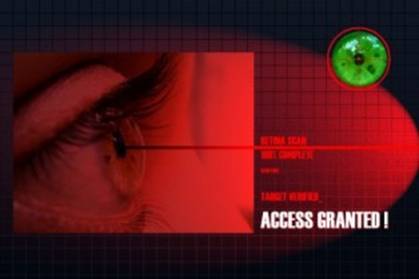Biometric Scanners Used For Business And Home Security!
Biometric scanners, take a closer look at several types of scanners available today that are commonly used by consumers and businesses as biometric security devices.
A biometric scanner is an essential part of the biometrics world. In order for biological data to be measured and analyzed, some type of scanner must be present to scan in the human body characteristic, whether it is a fingerprint, the iris, the retina, or even facial characteristics.
Today public security systems, corporate offices, and consumer electronics often boast these scanners to provide better security and convenience.
Many different scanners are available today so that different types of biometrics can be employed. Here is a closer look at some of the types of scanners available today that are commonly used by those implementing biometric systems.

Which Biometric Scanners Work
Retina Scanner
One of the scanners available today happens to be a retina scanner. A which is a biometrics security device that is designed to capture retina samples. The samples captured help with various processes, including identification, authentication, and verification. They happen to be one of the newer biometric techniques out there. One reason that a retina scanner is a top choice is because it happens to be more accurate than biometric type scanners that scan fingerprints. Retina patterns cannot be duplicated, the patterns of the retina are very unique, and the false acceptance and rejection rates are much lower with these scanners than with others, such as finger print scanners. Keep in mind that these eye readers are different from those that scan the iris.
Biometric Fingerprint Scanner
A biometric fingerprint scanner is another of the high tech scanners that are commonly being used today. These devices are specifically designed to scan a person's fingerprint so it can be identified or authenticated against current prints that are in a system. Once fingerprints are scanned by the biometrics fingerprint scanner, software is used to search prints to authenticate and identify. You'll find that these are probably the most popular scanners used for biometrics technology. They are cost effective, easy to use, and can be used in many different applications with great results.
Biometric Iris Scanners
Biometric iris scanners are biometrics scanners that carefully looks at the iris of a person's eye and uses pattern recognition techniques to identify and authenticate that person's identity. High resolution images are taken with the biometric iris scanners and passed through a biometrics system with high tech software to match up the iris to the person. While retina scanners use similar scanning camera technology, iris and biometric retina scans are different. The iris is the colored portion of the eye and special camera techniques create images of the iris, then turning them into mathematical representations so that an individual can easily be identified. Most scanners are of high quality and will not be affected by the use of contacts or glasses.
Biometric Scanning
Today biometric scanning is being used in a variety of different ways. Some biometrics type scanners are designed to read fingerprints, which is a type of scanning that has become extremely popular. Some companies use fingerprint scanners to keep track of members, including big gyms. Other companies use biometrics security scanning as a way to keep track of employees, where they are located, and to prevent time card fraud. Of course, biometric scanners are employed in many other ways as well. Some airports in certain areas of the world use security scanners to scan the faces of those in the airport to identify and authenticate people in an easier and faster manner. Security forces often use scanners to identify criminals. Even a few banks are beginning to use this security technology, with fingerprint ATMs available in certain parts of the world.
Biometric Scanner
You may be surprised to find that finger scanners are being used more than ever. In fact, you can expect to use a biometric scanners on a regular basis in the future. Already, many computers are equipped with scanners that check fingerprints before allowing a person on the computer. You can find a new computer mouse that employs a biometric scanner to check fingerprints before allowing access to certain information. Certain cell phones now have scanners on them to keep unauthorized users from using the phone as well. From home locks, to safes, to company security, to time clock systems, you can find a biometrics scanner in more places than ever today.
Retinal Scanning
Retinal scanning is a type of biometric scanning that uses the retina of a person and the unique patterns of that retina to confirm identity. Every person has a retina that is unique because of the structure of capillaries that help to provide blood supply to the retina. Certain degenerative disorders, diabetes, and glaucoma may end up altering the retina, but in most cases, the retina will not change throughout the life of a person. Since the retina is so unique and usually doesn't change, retinal scanning is definitely one of the most reliable biometric options when implementing biometrics type scanners.
Finger Print Scanner
A finger print scanner uses biometric technology to scan in fingerprints and identify people. These biometric scanners come in three basic types, including optic based scanners, radio frequency sensors, and capacitance based sensors. Each type of finger print scanner works in a slightly different way. This type of scanner is often used for building security, for computer access, security measures, for time clock applications, and many more.
Biometric Sensor
A biometric sensor works to scan the physical characteristic of a user and then produces electric currents. These sensors are used to scan various physical characteristics, including DNA, eyes, and fingerprints. Converters that convert analog to digital are contained in a biometric sensor and they allow the image to be digitized and then stored in the memory as digital information. Many different sensors are available and can be used in a variety of different industries.
Biometric Coprocessor
Since biometrics have become so popular when it comes to computer security, there has to be a way that computers are able to use biometric hardware so they can use physiologically unique features for identification and authentication. In order to use biometrics hardware, a biometric coprocessor must be installed within a computer, which allows computers to use various features like retinal images or fingerprints to identify the person. The biometrics coprocessor needed will depend upon the specific device that you use for biometric authentication.
Biometric Control
In many cases, biometric scanners are used for biometric control. This means that access to certain areas or access to data is controlled by biometrics security. In order to have access to the place or data, you must provide some form of biometrics identification, such as your fingerprints, retina scan, hand print, or even an iris scan. Many companies use biometrics control to aid with time clocks and access to certain areas within a company. Others use it as a method to control who can access sensitive data, requiring the use of biometric security scanners before allowing people to access the data, providing better security for the company.
Biometric Hand Scanners
Biometric hand scanners are probably one of the simplest of the biometrics security devices. Unless you are storing something that is very, very valuable, one of these scanners should be more than enough to get the job done.
Biometric Iris Scanning
Although biometric iris scanning may seem difficult, a CCD digital camera is actually at the heart of biometric eye scanning systems. Near infrared light and visible light are used to take a picture of the iris in high contrast.
Return to the top of Biometric Scanners
Biometric-Security-Devices.com
Free Credit Repair Ebook
The Secret To Better Credit!
Do You Want To Take Your Credit Score To The Next Level?



